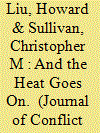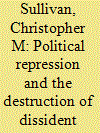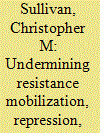|
|
|
Sort Order |
|
|
|
Items / Page
|
|
|
|
|
|
|
| Srl | Item |
| 1 |
ID:
181860


|
|
|
|
|
| Summary/Abstract |
Among security institutions, police occupy a unique position. In addition to specializing in the repression of dissent, police monitor society and enforce order. Yet within research studying state repression, how police institutions are used and deployed to control domestic threats remain under-explored, particularly as it relates to the dual functionality just described. In this study, we develop and test an explanation of police repression accounting for the bifurcation of Mann’s two modalities of state power: infrastructural power and despotic power. Infrastructural power allocates police resources to surveil dissidents and preemptively limit dissent’s emergence or escalation. Police deploy despotic power through repressive responses to political threats. Empirically, we employ unique data to investigate police repression and the modalities of power in Guatemala. To analyze how shifting the balance between infrastructural and despotic power affects police repression, we isolate damage occurring from an earthquake that exogenously reshaped the landscape of infrastructural power. Results affirm the role of infrastructural power in regulating the despotic power of the state. Where local infrastructure was most affected by the earthquake, the security apparatus lost the capacity to surveil nascent movements and predict their activity, thereby providing opportunity for dissidents to mobilize and forcing police to (over-)react rather than shutdown resistance preemptively. However, the intensity of state violence recedes as the state recovers from the infrastructural damage and regains its control of local district.
|
|
|
|
|
|
|
|
|
|
|
|
|
|
|
|
| 2 |
ID:
149518


|
|
|
|
|
| Summary/Abstract |
How does repression influence overt, collective challenges directed against political authority? To date, answers to this question have been inconclusive. This article argues that recent works inadequately address the topic because the focus has been on repression's impact on local civilians, with less consideration of dissident organizations. The author develops an organizational theory of challenger development and specifies predictions for how repression's effects on dissent are contingent upon the types of organizational behaviors targeted for coercion. The analysis employs original, microlevel data collected from previously confidential Guatemalan National Police records to assess the effects of repression during the years 1975 to 1985. Results show that the effects of repression are more complex than previously imagined. When repression targets the clandestine activities necessary to develop and sustain dissident organizations, such as holding meetings, training participants, and campaigning for funds, dissent declines significantly. But when repression is directed at ongoing, overt, collective challenges, it motivates a backlash that escalates dissent. Implications are drawn for how political order and conflict are understood and studied.
|
|
|
|
|
|
|
|
|
|
|
|
|
|
|
|
| 3 |
ID:
148320


|
|
|
|
|
| Summary/Abstract |
This study examines attempts by authorities to undermine overt collective challenges, such as protests, riots, or armed attacks, by targeting activities that precede and/or support such behavior. After providing a theory of how repression and resistance develop, the study analyzes unique data drawn from the confidential records of the Guatemalan National Police to assess the use of repression during the years between 1975 and 1985. Empirical tests demonstrate that (1) government forces anticipate challenger development by identifying the mobilization activities nascent challengers rely on to initiate and sustain overt collective challenges and (2) the use of repression designed to undermine such efforts is specifically targeted against radical (i.e., highly transformative) claims making. Implications are drawn for how we understand and study political order and conflict.
|
|
|
|
|
|
|
|
|
|
|
|
|
|
|
|
|
|
|
|
|